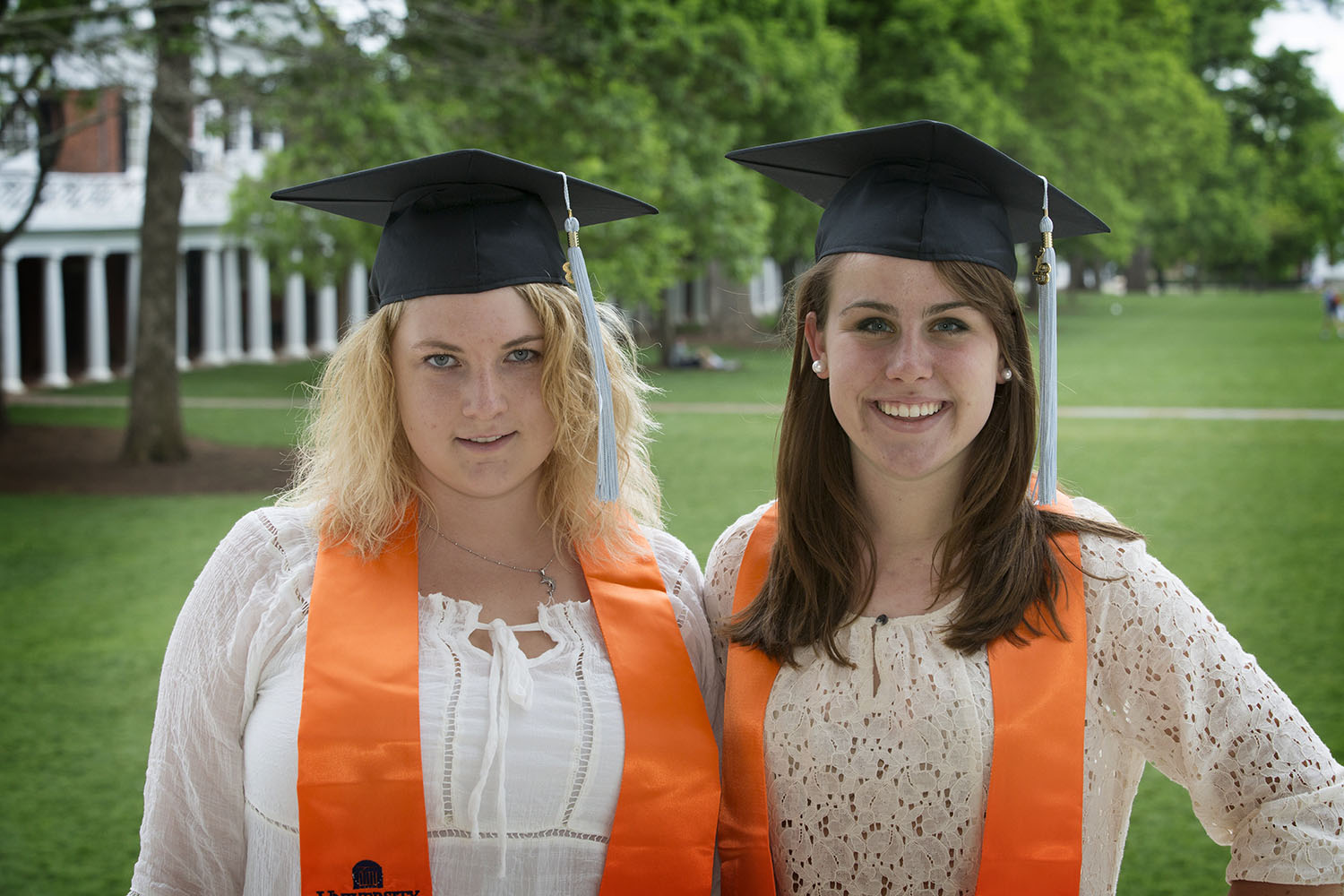UPDATED: May 15, 11:30 a.m., to include latest numbers of fast-track graduates.
CORRECTED: May 15, 5:20 p.m., to SPECIFY that "3+1" graduates are not wearing orange stoles.
UPDATED: May 16, 10:26 a.m., to include latest numbers of fast-track graduates.
- From Colbert and Webb to the Amazing Grads, Complete Coverage of U.Va.’s Class of 2013
- Read what U.Va. graduates who earned their undergraduate degrees in three years or less have to say about their experience
For the first time, the University of Virginia’s fast-track bachelor’s degree-earners – 82 in the Class of 2013 – will be honored at graduation for their “remarkable accomplishment.” You’ll know them by the orange academic stoles they’ll be donning at U.Va.’s 184th commencement May 19, a gift to them from the Office of the President.
“Each year, dozens of U.Va. students complete their requirements in less than four years,” U.Va. President Teresa A. Sullivan said. “This is a remarkable accomplishment and a testament to the energy and intellectual vigor of these students.”
Eighty graduating students completed the requirements for a bachelor’s degree in three years, and two – Trevor Klein, an environmental sciences major in the College of Arts & Sciences, and Grace Liu, a drama major in the College – completed their requirements in only two years.
“We salute them, and look forward to applauding their future accomplishments as alumni,” Sullivan said.
In recent years, an increasing number of students have used Advanced Placement credits, along with those earned in summer session and January Term classes, to accelerate their undergraduate studies and graduate in three years. Some at that point enter the workforce, while others opt to pursue additional degrees, reducing the time it would normally take to graduate with both degrees by a year or more.
The U.Va. students earning their bachelor’s degrees in three years or less represent 2.6 percent of the Class of 2013’s ranks. By comparison, about 2 percent of students earning a bachelor’s degree in 2007-08 did so in three years, federal data show, according to a study of 33 states by the nonprofit Complete College America.
Emily Riedel is among those who will receive an orange stole. The Northern Virginia resident, who will earn her degree from the Curry School of Education in speech pathology and audiology, said in an email, at first it “seemed crazy” to give up a year of her undergraduate experience.
“I needed my four years of the ‘best time of your life.’ Then I thought, why does it have to be four years? Our experiences should be measured by the quality and not the quantity.
“Even with one less year in my undergraduate career, I’ve been able to dance in front of thousands of people in Scott Stadium and John Paul Jones Arena. I was able to roam the cobblestone streets of Belgium and ride bikes in the Netherlands. I presented research with a group of nine extremely competent women to win first place at the Speech and Hearing Association of Virginia. I really had the chance to think in religion classes and reflect on ideologies made from 21 years of living under the roof of a minister. I had the chance to appreciate all the stuff my guidance-counselor mother puts up with in my education classes. I had the chance to observe and learn from a diverse set of individuals. These experiences helped me learn about myself.
“I am happy for my experience here at Mr. Jefferson’s University. I’ve made some of the best relationships that I trust will stand another big storm or race.
“… When it comes down to the real reason for graduating early, it’s pretty simple. It’s required to go to 2½ years of graduate school to become a certified speech-language pathologist” more affordably.
Garrett Hynson, of Doylestown, Pennsylvania, who’ll earn his economics degree from the College, agreed. “Personally, I feel that if you have enough AP credits, and are not either double-majoring or in a two-year program such as the Comm School, it is a no-brainer to finish your degree in three years. This is especially true if you are an out-of-state student, such as myself. Finishing early will save me approximately $50,000.”
Another fast-track option for students is one that Sullivan proposed early in her tenure, the “3+1” program. It allows students to complete bachelor’s and master’s degrees in four years. In the fall of 2011, the University offered more guidance and options for students who wanted to follow that path.
Students choosing the 3+1 option can now earn a bachelor’s in their desired major in three years or less, and a one-year master’s in commerce, Middle Eastern and South Asian studies, public policy, statistics and teacher education. In addition, the Graduate School of Arts & Sciences is exploring professional master’s degree programs in chemistry, environmental sciences, French and religious studies (conflict resolution), according to the Provost’s Office.
In 2013, 14 students will graduate with a bachelor’s and master’s degree within four years.
The accelerated bachelor’s and 3+1 programs respond to one of the objectives of Gov. Robert F. McDonnell’s 2011 Higher Education Opportunity Act, which calls for 100,000 more degrees to be awarded over the next 15 years.
For more comments from U.Va.’s fast-track grads, click here.
Media Contact
Article Information
May 13, 2013
/content/class-2013-new-tradition-uva-honors-grads-who-earn-degrees-three-years-or-less

